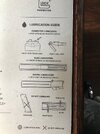I used to run my Glocks pretty dry (per the instruction manual), and they always ran fine, but in the last several years, have increased the amount of oil after hearing Larry Vickers say most of his students under-lube their guns for optimum performance.
The Myth of Over LubricationThe TAC-TV Crew and Larry went to the Gunsite training facility in Northern Arizona to debunk some classic small arms myths inclu...

youtu.be
In line with this, I recently attended a pistol class with a very good and well recognized firearms instructor who talked about lubrication. He said that in addition to lubrication, he uses more oil than "minimum" because the oil helps remove excess carbon. Any 'excess' oil will be shed by the firearm during shooting. By excess, he didn't mean go nuts with the oil, but to use 'what seems like enough, and then add a bit more'. He also mentioned on his lesser used weapons, will add oil to the already clean gun before a range session.
He also mentioned he used to use Ed's Red, but now he uses Lucas oil almost exclusively because he likes convenience of the needle tipped bottles. I've been using this same Lucas for a while because it's available all around me at my local O'Reillys Auto Parts stores.
 )
)




